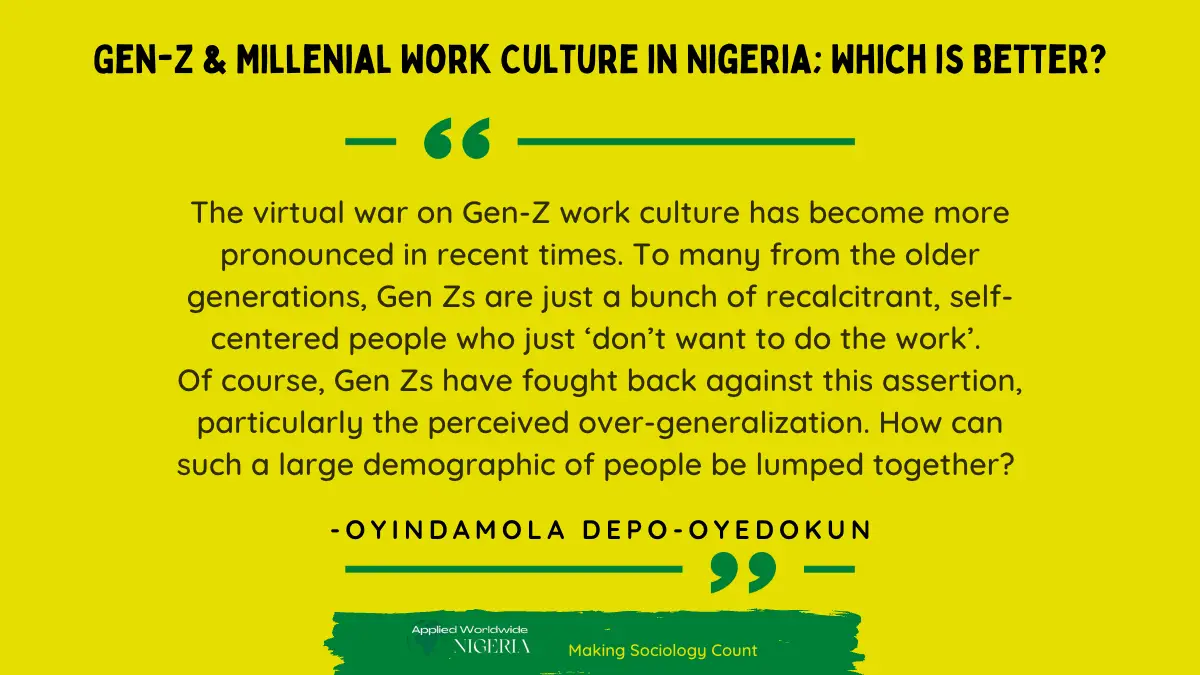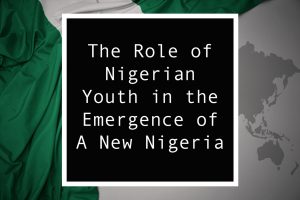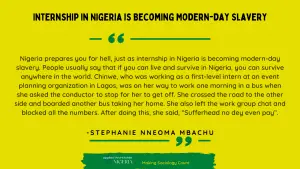The virtual war on Gen-Z work culture has become more pronounced in recent times. To many from the older generations, Gen Zs are just a bunch of recalcitrant, self-centered people who just ‘don’t want to do the work’. And this is what brings out the debate about Gen-Z & millennial work culture.

Of course, Gen Zs have fought back against this assertion, particularly the perceived overgeneralization. How can such a large demographic of people be lumped together? Not all Gen Zs are the same as even in the same era. Various factors such as culture, religion, social class, and so on pose major influences that distinguish them.
Perhaps people have used character flaws to define an entire generation of diverse individuals and essentially made the exceptions the rule. There are hardworking Gen Zs, as there are lazy millennials and vice versa.
Besides, hasn’t every older generation complained about the newer generation from time immemorial? Could what is seen as unique to this generation just be characteristic of younger people who are trying to carve out their own paths in the world? Will Gen Zs just grow up to become like Millennials?
Nonetheless, stereotypes aren’t birthed in a vacuum, so perhaps there is some truth to the claims about Gen Zs.
This article will explore what seemingly makes Gen Zs so different and whether or not we should be worried about their differences.
What Makes Gen Zs Different?
Gen Z refers to the class of people born between 1997-2012, i.e., aged 9-25 years old. This age group makes up 26% of the global population. With an even more significant number for Nigeria, a country with one of the largest youth populations in the world. In fact, half of Nigeria’s population is under 19 while over a fifth of the population is aged between 15-25.
This means Gen Zs either make up a considerable proportion of the current workforce or will do so in the future. Thus, understanding them is of utmost importance.
The following things separate Gen Zs from the preceding generations:
- Born into a technology boom:
Most people who fall into the Gen Z category were exposed to the internet, smartphones, and advanced technology systems from an early age, especially the younger Gen Zs. There is an undoubtedly high level of exposure and ease that comes with that. Gen Zs are at their prime in a world that has become a global village with millions of people sharing ideas from all over the globe, where information on almost anything is available with the click of a button, or the swipe of a screen – just like that.
- Work-life balance, but heavy on the life:
With exposure comes the desire to see more, explore more, and enjoy more. With ease comes the increased awareness that life is not supposed to be that hard. Life is for the living and Gen Zs are fully aware of this.
Chasing a career is great, but it is not the be-all and end-all of life, so more than ever, Gen Zs seek flexibility in the workplace. This is perhaps why they gravitate so much towards hybrid and remote work structures. Of course, the fact that many of them entered the workforce during the pandemic when remote work was the order of the day, compounds this. Where older generations struggled to adjust to having to work completely online, Gen Zs largely thrived.
Additionally, this generation is more aware of the need for total well-being. You’ll hardly hear millennials taking days off to ‘take care of their mental health. Gen Zs have put names to many issues that were largely ignored by older generations, and are choosing to deal with them accordingly.
- Individuality above all else:
Gen Zs are less willing to fall in line with established norms. There is a noticeable rebellion, although one could argue this is normal for any younger generation. Nonetheless, this generation values the freedom of unique ways of self-expression. The need for individuality has spurred many to seek alternative paths in the form of entrepreneurship, or even just workplaces with non-traditional structures. Mazars found that 25% of Gen Zs aspire to ‘be their own boss’ and 11% wish to work in a start-up.
- Seeking the thrill:
A 2022 report by Seamless HR revealed that 70% of the Gen Z working class will not stay on a job for longer than 2 years. This is largely because they are always looking to take on more challenging opportunities, and also seek ‘more entrepreneurial involvement in their work’. In contrast, 56% of millennials (ages 26-40) will remain at an organization for 3-5 years.
The Case of Older Generations
Millennials were born between 1981-1996 and are so-called because they came of age at the turn of the millennium. Many of them were already adults when there was the internet and technology boom. They experienced the time before the internet explosion and the time after it.
On the other hand, Generation X (born 1965-1980) was already fully formed by the time the internet, smartphones – even cell phones – and social media came into the picture. Baby Boomers (born 1946-1964) before them were only exposed to the expansion of television in their time.
Millennials complain about Gen Zs the same way Gen Xers complained about Millennials’ individualism, idealism, and entitlement. And the same way Boomers lambasted Gen Xers’ cynicism and laziness. Millennials were even dubbed the ‘Me Me Me Generation’.
The tension has always existed between the old and young generations, and will definitely continue to in the future.
Watch out, Gen Zs! Generation Alpha will also label you old-fashioned, and you will soon be the uncool old people who write off the younger ones and blame them for the degradation in society. It is simply the cycle of life!
From generation to generation, the rule of thumb is that people will talk down on what they don’t understand. Also, people will forget (or downplay) the bad and exalt the good more often than not, a phenomenon called ‘rosy retrospection.’
Verdict: Good, Bad, or Just Okay?
The things that characterize most Gen Zs have both pros and cons. What’s important is balance and creating an environment that’s conducive to all classes of people, irrespective of their age groups or backgrounds.
There needs to be less dismissiveness and more of a willingness to meet each other halfway. Workplaces need to accommodate the different qualities of their workers’ demographics and leverage them for their benefit. Essentially, there is a need to adjust.
Moreso, there should be room for nuance and consequently, treatment on a case-by-case basis. There may be a general rule to the way Gen Zs behave, but it doesn’t mean there won’t be multiple exceptions. Employers should understand who their employees are on an individual scale.
Finally, yes, this generation is different. But the world will carry on just fine with it, as it always has.








